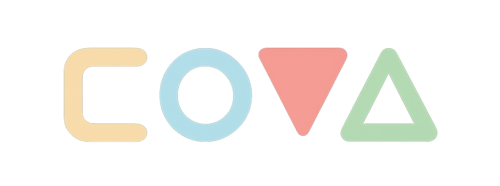3 releases
| new 0.1.2 | May 24, 2025 |
|---|---|
| 0.1.1 | May 23, 2025 |
| 0.1.0 | May 23, 2025 |
#1439 in Math
84 downloads per month
480KB
6.5K
SLoC

Cova
A unified Rust ecosystem for rigorous mathematical computation, bridging abstract algebra and computational topology to provide a comprehensive foundation for mathematical software development.
Mathematical Vision
Cova represents a principled approach to mathematical software, where abstract algebraic structures provide the computational foundation for sophisticated topological and geometric algorithms. By unifying algebra and topology in a single ecosystem, Cova enables mathematical computations that span traditional disciplinary boundaries.
Unified Architecture
The Cova ecosystem consists of two complementary mathematical domains:
Abstract Algebra (cova-algebra)
Provides the algebraic foundation with rigorous implementations of:
- Arithmetic Systems: Modular arithmetic, ring theory, and field extensions
- Structural Algebra: Groups, rings, fields, modules, and vector spaces
- Advanced Constructions: Category theory, tensor algebra, and Clifford algebras
- Computational Framework: Type-safe operations preserving mathematical properties
Computational Topology (cova-space)
Builds sophisticated topological structures and algorithms:
- Foundational Topology: Topological spaces, metric structures, and geometric abstractions
- Complex Machinery: Simplicial and cubical complexes with efficient storage and operations
- Homological Algebra: Chain complexes, boundary operators, and homology computation
- Advanced Methods: Sheaf theory, persistent homology, and topological data analysis
Algebraic-Topological Synergy
The power of Cova emerges from the interaction between its algebraic and topological components:
Coefficient Systems
Topological computations (homology, cohomology) use algebraic structures as coefficient systems, allowing homology over arbitrary rings and fields defined in cova-algebra.
Geometric Algebra
Clifford algebras from cova-algebra provide natural frameworks for geometric computations in the topological spaces of cova-space.
Categorical Foundations
Category theory concepts span both domains, providing unified abstractions for mathematical constructions and morphisms.
Computational Efficiency
Algebraic optimizations (efficient field arithmetic, tensor operations) directly enhance topological algorithms that depend on large-scale linear algebra.
Usage
Unified Access
Import the entire ecosystem:
use cova::prelude::*;
Domain-Specific Access
Access individual mathematical domains:
use cova::algebra::prelude::*; // Abstract algebra
use cova::space::prelude::*; // Computational topology
Cross-Domain Computations
Leverage both domains together:
use cova::prelude::*;
// Compute homology over a custom finite field
let field_element = Mod7::new(3);
let homology = complex.homology::<Mod7>(dimension);
// Use Clifford algebra for geometric transformations
let rotor = CliffordElement::from_bivector(bivector);
let transformed_space = apply_rotor(space, rotor);
Mathematical Scope
Cova covers essential mathematical areas with seamless integration:
Cova Ecosystem
├── Abstract Algebra
│ ├── Arithmetic (modular, primitive types)
│ ├── Group Theory (abelian, non-abelian)
│ ├── Ring Theory (rings, fields, semirings)
│ ├── Module Theory (vector spaces, linear algebra)
│ ├── Advanced Algebra (Clifford, Boolean)
│ ├── Tensor Calculus (fixed, dynamic tensors)
│ └── Category Theory (morphisms, composition)
└── Computational Topology
├── Set Theory (collections, posets)
├── Topological Spaces (metric, normed)
├── Cell Complexes (simplicial, cubical)
├── Homological Algebra (chains, homology)
├── Sheaf Theory (categorical constructions)
└── Topological Data Analysis (filtrations)
Design Principles
Mathematical Rigor
All implementations follow strict mathematical definitions with proper algebraic and topological properties preserved through the type system.
Compositional Architecture
Structures are designed for seamless composition, allowing complex mathematical constructions from fundamental building blocks across both algebraic and topological domains.
Performance Through Abstraction
High-level mathematical abstractions are implemented with careful attention to computational efficiency, enabling both correctness and performance.
Type-Driven Safety
Rust's type system encodes mathematical constraints, preventing invalid operations while maintaining zero-cost abstractions.
Feature Integration
Optional Features
parallel: Enables parallel computation acros topological algorithms (filtration construction)
Cross-Crate Compatibility
All types and traits are designed for interoperability, allowing algebraic structures to serve as coefficient systems for topological computations and vice versa.
Applications
Cova provides a foundation for:
- Scientific Computing: Rigorous mathematical foundations for numerical algorithms
- Computer Graphics: Geometric algebra and topological methods for rendering and modeling
- Machine Learning: Topological data analysis and algebraic machine learning methods
- Mathematical Research: Experimental mathematics with computational verification
- Educational Software: Teaching tools with mathematically accurate implementations
Documentation
Complete documentation covering both mathematical foundations and practical usage:
License
This project is licensed under the AGPLv3 License, ensuring mathematical software remains open and accessible to the research community.
Dependencies
~0.5–0.8MB
~15K SLoC